‘The earwig when bisected fights itself’
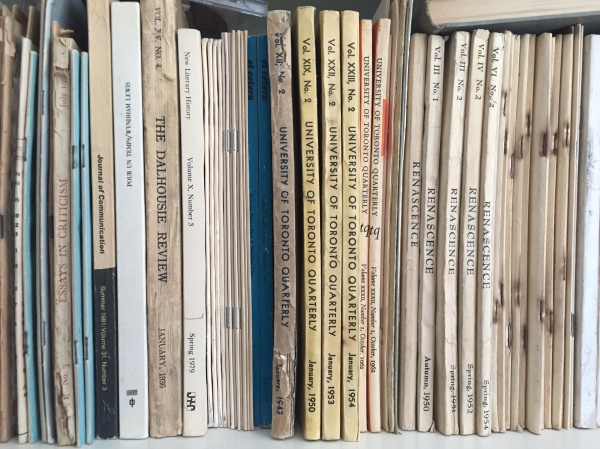
Dear reader,
“If the past has anything to teach us it can only do so as the present. We can only evaluate the past or illuminate it from the point of view of the present. We can only correct the true bias of the present time by coming to know that time as A time, not THE time. Each age has to recreate Homer and Shakespeare in its own image. This is no mean task, because in doing so we have to become them.
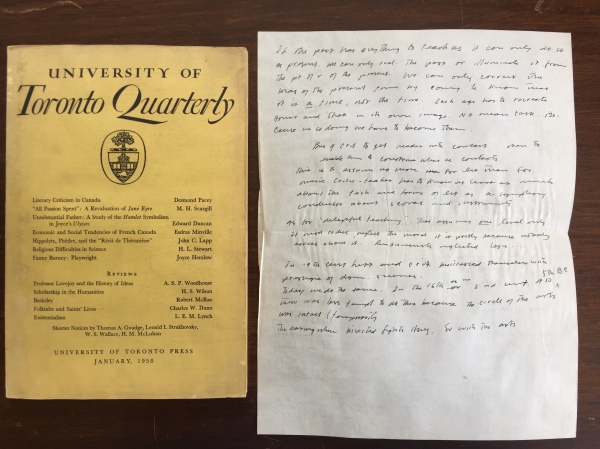
So reads a page written by Marshall McLuhan and tucked into his copy of the University of Toronto Quarterly from January 1950, which rests in the library of Eric McLuhan. This issue contains a review by H. M. McLuhan (Marshall wouldn’t drop the ‘H.’ for a few years yet) of “‘Essays in Criticism, 1920-1948: Representing the Achievement Modern British and American Critics,’ Selected by Robert Wooster Stallman. With a Foreword by Cleanth Brooks” at the end of the journal.
I should say the above is my transcript which a few embellishments to make it flow. I am confident of my transcript except for a few spots in the second-last paragraph, where I have made vague suggestions for 2/3 cases.
The start of the above note seems to echo, or begin from, the close of Marshall’s review, which reads:
“If the present is inevitably the only door to ANY past, it should be plain from these essays that it is today possible to apprehend our literature from Langland to Eliot with a variety of grasp and relevance of effect that will establish its position as a university discipline in new and impressive ways.”
In the third paragraph, Marshall refers to “delightful teaching,” which would seem to be a reference to a review in this issue ‘Scholarship in the Humanities,’ by H. S. Wilson, a review of ‘Theory in Literature’ by René Wellek and Austin Warren. Marshall makes a margin note beside this part of a paragraph:
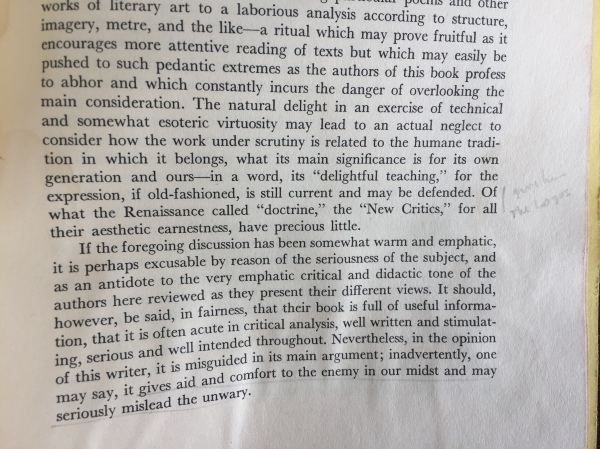
“There is another fashion prevalent among some contemporary critics and teachers, of which the present book takes extended and eulogistic notice, a fashion of submitting particular poems and other works of literary art to a laborious analysis according to structure, imagery, metre, and the like–a ritual which may prove fruitful as it encourages more attentive reading of texts but which may easily be pushed to such
pedantic extremes as the authors of this book profess to abhor and which constantly incurs the danger of overlooking the main consideration. The natural delight in an exercise of technical and somewhat esoteric virtuosity may lead to an actual neglect to consider how to work under scrutiny is related to the humane tradition in which it belongs, what its main significance is for its own generation and ours–in a word, its “delightful teaching,” for the expression, if old-fashioned is still current and may be defended. Of what the Renaissance called “doctrine,” the “New Critics.” for all their aesthetic earnestness, have precious little.”My guess is that these notes were made by Marshall McLuhan when he received his copy of this journal in early 1950 – the handwriting is consistent with that period, and the reference to and comment on Wilson’s piece would tend to confirm it.
It struck me because of the last note ‘the earwig when bisected fights itself. So with the arts.’
Yours,
Andrew McLuhan
By Many Means, Divers Devices: Lost and Pound – a journal, a library, a letter, an Equation
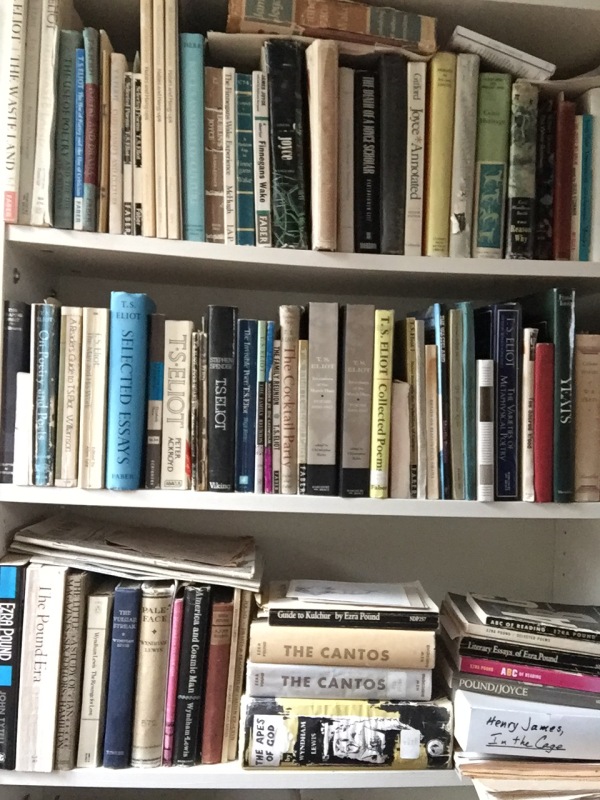
Eric McLuhan’s Joyce, Eliot, Pound shelves.
Dear reader,
When I started my second McLuhan inventory, the inventory of Eric McLuhan’s library, I thought I would be visiting this old forum more often. That has not been the case.
As it happens, a lot has changed in the almost-decade since I began my inventory and journey of discovery with the ‘working library’ of Marshall McLuhan. Personally, I am married and have two young boys: Ezra and Virgil, who recently turned 5 and 3 years old. Family delights and obligations mean I have fewer spare hours to devote to typing up blog posts about my work with books and libraries McLuhan.
Social media is now a thing – more to the point, smart phones are now a thing.
When I first launched the good ship Inscriptorium, I used a Cannon Powershot digital camera – a handy little thing. Now I’m up to an iPhone 6, and spend more time with it than this, my trusty MacBook Pro.
A blog post used to mean taking photos on the camera, and later connecting it by cord to the computer, and then taking the time to write a supposedly-interesting volume of words to describe this or that find from the inventory process.
I would begin my posts ‘Dear reader,’ with a bit of a laugh that there might be a single person interested and reading. The stats of the site tell me that readers of this blog are few but interested – the typical visitor reads several posts in one go.
So I’ve seen this blog as a place to record for posterity some of the interesting things I came across in the process of exploring, documenting, and inventorying the library of Marshall McLuhan. It was (and is) important to me to share the things I find even if it’s only for a very small audience. I felt slightly vindicated on my feeling of the importance of the library when UNESCO named it (along with the McLuhan papers at Libraries and Archives Canada) part of its ‘Memory of the World’ registry – basically the intellectual equivalent of a World Heritage Site.
In my opinion, Eric McLuhan’s library is no less significant than Marshall’s. I know that no one else is likely to share that opinion – and that’s fine. I think of them a bit like Socrates and Plato, or Plato and Aristotle, teacher and student both. I’m not suggesting they’re the same thing, but I see it that way. I see both Marshall and Eric’s work as being significant and in their own way very valuable. Eric did things Marshall couldn’t – and one thing I’ve learned for sure is that Marshall respected and trusted no colleague more than his son.
But I digress.
The point I was trying to get to was that with life and technology circumstances being what they are, I don’t have occasion to fill this blog very much these days. It is much more convenient, and more effective in terms of reaching people, to take a photo of something and upload it to The McLuhan Institute’s Instagram account, to take a pithy quote or brilliant quote and type it to The McLuhan Institute’s Twitter account, and then when I have slightly more to say I’ve been doing it over at The McLuhan Institute on Facebook, where I’ve managed to build a not-insignificant little following.
It’s on the TMI Facebook where I am now doing a weekly 15-minute (or so) live broadcast from Eric McLuhan’s library aka The Scriptorium aka TMI HQ, and which has really taken over from this blog – it’s just so easy to hit ‘go live’ and talk for a few minutes, hold up a book for examination, throw a few pics onto the Instagram page, and then archive the live session over at The McLuhan Institute’s YouTube page.
When you add it all up, it’s more work than this blog ever was – but the reach is much greater, and this is not simply a vanity project. A core reason for starting The McLuhan Institute was to make McLuhan material available by all possible means with a focus on accessibility and simplicity. Not dumbing anything down, but helping people connect dots.
That was the preamble. Now, what follows I posted last week on TMI FB. If you’ve gotten this far, you might make it even further and note some duplication in what’s said above and below. I’ll just leave it and let you be the editor.
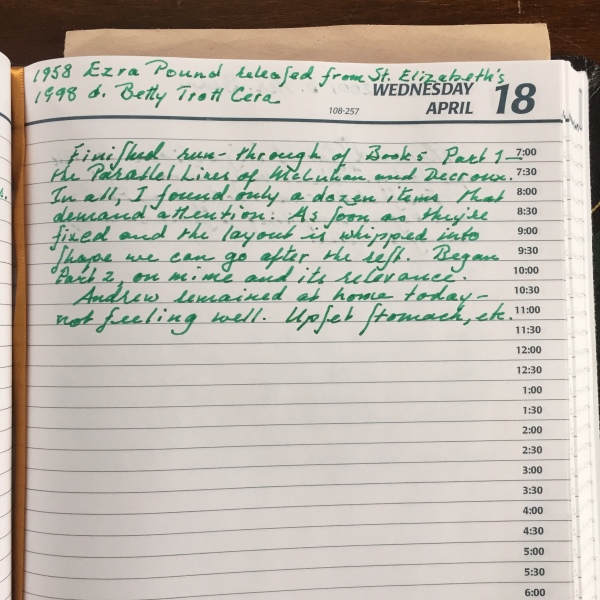
“1958, Ezra Pound released from St. Elizabeth’s
1998 d. Betty Trott Cera”
So reads the header for this day (April 18) in years gone by from Eric McLuhan’s 2018 journal. Over the last year I’ve been following his journal to relive his last year on earth, which would end just under a month from this day.
The day’s entry, in his customary green ink-filled fountain pen reads:
“Finished run-through of Book 5 Part 1 — the Parallel lines of McLuhan and Decroux. In all I found only a dozen items that demand attention. As soon as they’re fixed and the layout is whipped into shape we can go after the rest. Began part two, on mime and its relevance.
Andrew remained at home today – not feeling well. Upset stomach, etc.”
Dad’s New Year’s day usually consisted of American college football and transferring information such as dates of important such as births, deaths, and things in between, from the previous year’s journal to the new one at the top of each page.
He told me that he started a daily journal in 1975 when my eldest sister was born, and encouraged me to do the same. I’d tried a couple of times but it never stuck. I’m coming around to giving it another go…
Dad’s note for April 18th 2018 would have been written the following morning, as his habit was to do his journal early the day after.
1/ He’s talking about the final book in The Human Equation (THE) series, which he developed with his friend Wayne Constantineau who was a mime of the old school, trained in Paris. If memory serves, Wayne studied at the school of Marcel Marceau.

I have a lot of memories of Wayne and his former wife Carmen, as he and dad were long-time friends. They were both involved in the circus arts and always joking and pulling gags. Wayne had a bit about the ubiquity and invisibility of seating called ‘Our Affair with the Chair’ (there’s something like an average of 16 seats per person in N. America if you count everywhere one ‘sits’) which I use sometimes when talking about invisible media environments.
Wayne died in 2006, four years before the first book of THE came out. THE was the result of a team effort of about a dozen people, funding crabbed together from various generous sources, edited and published by Don Bastian who was, I believe, dad’s editor from Stoddart.
At the time of Eric’s death last May, he/they were working on the final fifth installment of THE. I haven’t had word yet on whether it’s done so I presume it’s not but I hope it will eventually be published. The series runs:
1/ The Human Equation: The Constant in Human Development and Culture from Pre-Literacy to Post-Literacy
2/The Science of Investigation: Working with Equations
3/Know Thyself: Action and Perception
4/Posture and Theories of Everything
5/ Mime and Media
In the dedication to the first book, Eric writes:
“This work represents, I feel, an important development of the living legacy of media studies left by my father, Marshall McLuhan.”
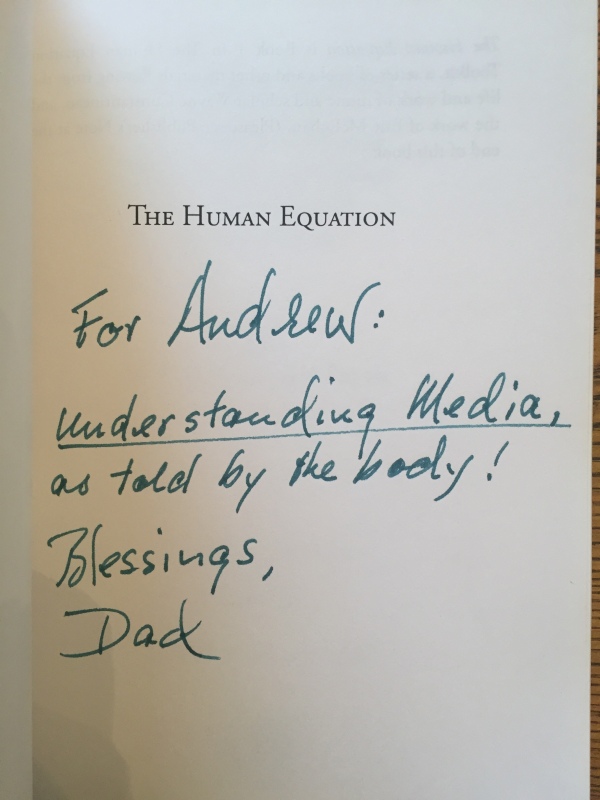
He told me that it’s “Understanding Media as told by the body.”
If I’m being honest, I haven’t given the books a fair go. They seemed a little … I don’t know … hokey to me. People put a lot of work into them, so I don’t want to talk them down. Maybe I should get over it and put my feelings aside and read them – if dad says they’re an important development, he wasn’t one to exaggerate that sort of thing.
One of the last things dad was working on was a tetrad (the application of the four ‘laws of media’ to a human innovation by way of a sort of diagram) which also incorporated THE (an adaptation of the tetrad principle using the ‘modes of action’ from THE) on the same problem, in the same illustration. This was new, something he’d never done before. He showed it to me the night before he died.
2/ Betty (Trott) Cera was a long-time friend of the McLuhans. Her husband, Rene, was the painter who did the large ‘Pied Pipers All’ mural for Marshall McLuhan and the Centre for Culture and Technology which now hangs in a cafeteria at St. Michael’s College.
I’m not aware of any extensive look at the relationship between the McLuhans and the Ceras, though it’s warranted. The McLuhans owned many of Rene Cera’s paintings, and it would be interesting to gather what material there is which would shed some light on why Marshall thought Rene’s paintings were so interesting.
There is plenty of correspondence between Betty Cera and Corinne McLuhan in our archive, but I have as yet not had the time to go through it in much detail except to note its presence. Betty and Corinne remained friends long after their husbands died.
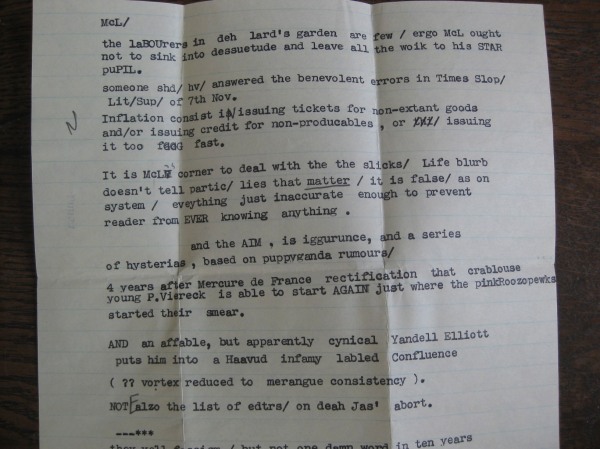
3/ About Ezra Pound there is much to say, though I am neither an expert in Pound or ‘the moderns’, not having had the time to dive deep into that universe yet, so I can only relate what I know from experience and stories.
The note above recalls the date of his release from the mental hospital in which he was confined for about a dozen years following his detention in Italy after WWII. He had been charged with treason for his activities over there and only escaped prosecution by being found not competent to stand trial and confined to St. Elizabeth’s in Washington, D. C.
Marshall McLuhan, who was an expert as well as a devotee of modernist poetry, was a big fan of Pound’s work, if not his politics. He visited Pound at St. Elizabeth’s along with, I believe, Hugh Kenner, and he and Pound exchanged letters.
Marshall said: “Nobody could pretend serious interest in my work who is not completely familiar with all of the works of James Joyce and the French symbolists,” and you could probably throw in Eliot, Lewis, and Pound to that, among others. (I try not to pretend.)
As you can see in the photo of Eric McLuhan’s library, Pound (as well as James Joyce and T. S. Eliot and Wyndam Lewis whose work is just out of frame) features prominently in his collection.
Pound also features prominently in Marshall McLuhan’s library, as I found when I was making an inventory of it almost a decade ago.
In 2010 I was doing my first run-through of Eric McLuhan’s library before going through the 200 boxes of Marshall’s books which were in storage at Eric and Sabina McLuhan’s place in Prince Edward County when I came across a book on Pound titled ‘Ezra Pound and the Cantos.’
Eric had inherited his father Marshall’s library as they were not just books but tools they worked with. Prior to the library being relocated (it rests at the Fisher Rare Book Library in Toronto where Eric’s library may also one day go) I did an inventory of it, much as I am doing now with Eric’s.
Eric had many of Marshall’s books on his shelves, so my first job was to pull the books which were more Marshall’s than Eric’s. This was a bit tricky, as they both used the books, but it was pretty obvious which were from Marshall’s original collection, and should remain with it when it moved.
Back then, I kept a WordPress blog called ‘Inscriptorium’ (we called dad’s office/barn ‘the Scriptorium’) where I did posts on some of the more interesting things I found while exploring and documenting Marshall McLuhan’s ‘working library.’
Now, I use Facebook, Instagram, Twitter, and YouTube to document and share because it’s much simpler and less time-consuming than a ‘traditional’ blog. (This post is an exception, as well as case-in-point because I’ve been working on it for several days).
Looking back on the blog, I can see how far I’ve come in a decade. My work on Marshall’s library really marks my descent into the McLuhanstrom, where I was hooked. I learned so much about Marshall and his work and his process, as well as him personally. I wasn’t expecting that. (My writing style has also changed and hopefully improved.)
Now, as I go through my father’s library, I am learning more about him and his work and his process. I am surprised by a lot of what I find.
I’ve given several presentations about Marshall’s library. When I finish this latest inventory, I hope to have opportunity to talk about Eric’s library as well as the relationship between father and son and their libraries.

Thanks for being here,
Andrew McLuhan.
Birch Bark Bookmark
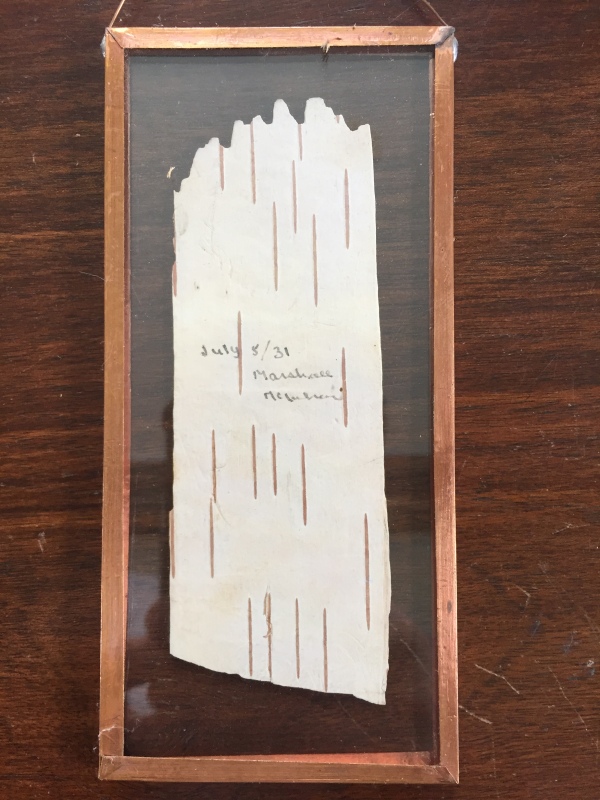
In the fall of 1928, Marshall McLuhan enrolled into the Engineering program at the University of Manitoba, not far from where he lived in the city of Winnipeg.
The following summer, he worked as a ‘rod man’ on a surveying crew in northern Manitoba, and enjoyed it all so much he switched to a Bachelor of Arts.
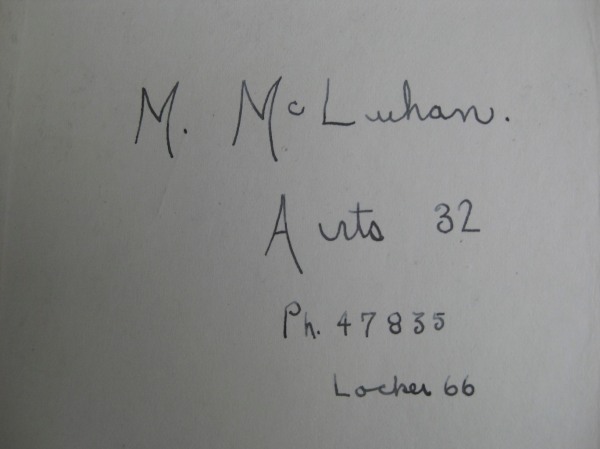
It was more likely his growing love of literature and intellectual pursuits rather than distaste of toil or engineering as a subject which led to the major change in direction.
But back to the birch bark bookmark:

I know the dates are wrong. If you want to get all technical and historically accurate my story falls apart at this point, but to me this scrap of Manitoba Birch bark is symbolic of that pivotal moment when Marshall McLuhan makes the huge life change from studying to be an engineer to a Liberal Arts program in which he focused on history, philosophy and literature.
The world would not be the same.
I discovered this little bookmark tucked into a book in my dad’s library years ago. I don’t remember which book – it didn’t seem important. I thought it was beautiful, and that I would keep it as a remembrance of my grandfather – my dad didn’t mind.
I had my friend Vanessa Pandos, a glass artist, make a little frame to preserve it, and it has hung in dad’s study, the ‘Scriptorium’ since. It hangs on a beam just to my right as I sit at my desk, now inventorying my father’s books — a memento from when I inventoried Marshall’s books at the same desk, almost a decade earlier.
Back then, when I started inventorying Marshall McLuhan’s books, I had only just begun to get very interested in the McLuhan work. [I had been interested earlier, but it didn’t really click for me, I didn’t really begin to be able to understand much of it until into my 30s, and once it started to make sense, its got more interesting.] It was those 18 or so months taking stock of Marshall’s 6000+ item library, chatting with my father and asking him questions, getting to know my grandfather through his books and their contents like this book mark which really drew me in.
Here I am a decade later [since we’re playing a little loose with chronology for the sake of the story], having followed my dad around the world while he gave lectures, having done my best to learn everything I can from him — here I am now inventorying his library too.
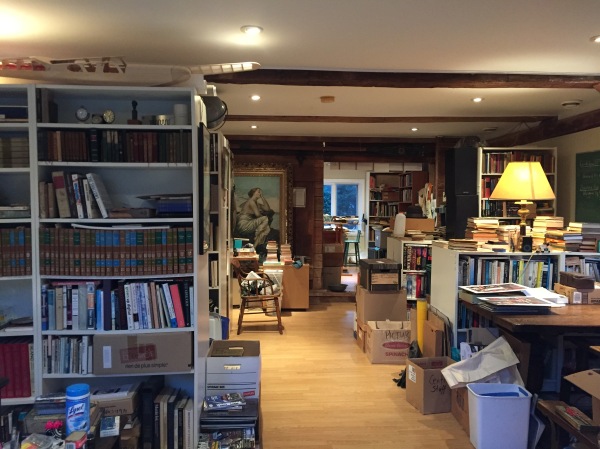
Some of the choices we make, like switching majors from Engineering to the Liberal Arts can change not only our lives, but quite literally change the world.
Yet some of the seemingly little things we do, like scribbling our name and the date onto a scrap of birch bark and tucking it into a book, can ripple down through time and almost a hundred years later be meaningful and precious to a grandchild who will put it on display for the world to see and think about those bigger choices we make.
Thanks for being here.
Andrew
60 Years Later, The Medium is the Message. (with an important note on this blog + other means of sharing my journey)
Dear reader,
Two things.
First:
In conversation with my friend Carol Sill last night, I realized that a significant anniversary had passed by without taking note.
Carol and I were talking (among other things) about the idea of having a McLuhan / McLuhan Institute event in her hometown, Vancouver. I had been thinking about Howard Gossage and the McLuhan Festival in San Francisco in 1965… thinking about what an event in Vancouver could look like I searched my capricious memory for a McLuhan/Vancouver connection and remembered a book I came across while cataloging Marshall’s library – and that I did a blog post about it:
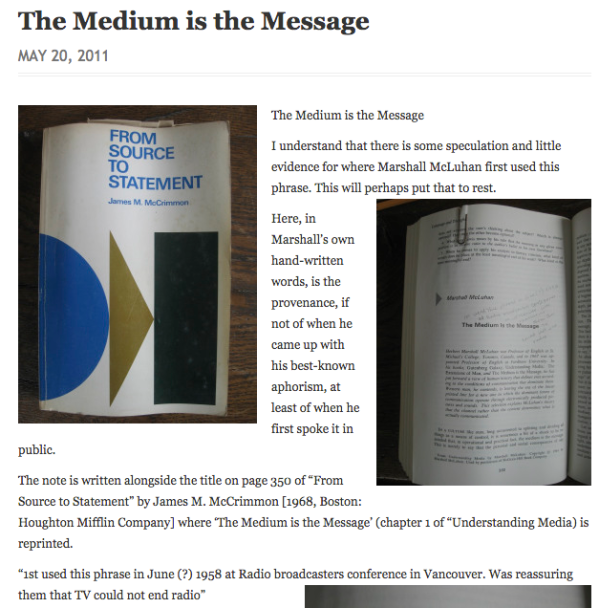
So the statement for which Marshall McLuhan is (arguably?) most known and most misunderstood is 60 years old this year.
The medium is the message.
Second:
Attentive readers of inscriptorium will know that I am on the second part of my inventory adventure.
The first part was the 18 months (or so) that I spent inventorying (and documenting and getting to know) the annotated ‘working’ library of my grandfather Marshall McLuhan. I had a grant to help with that, and I took a lot of photos with my Canon Powershot, and I spent a lot of time flipping through the books and getting to know them, and getting to know a grandfather who died when I was two years old – but I learned a lot about him through those books.
I shared that journey with the world here on this blog, and I created a twitter account where I shared some of the actual annotations. It seemed like the right thing to do.
This time around, it’s my father Eric McLuhan’s books I am inventorying, and the situation is very different. I don’t have the luxury of time or other resources I did the first time around. This means that I don’t have the time to spend on each book that I did before, and I don’t have the time to take a lot of photos and make a lot of notes and write up a lot of blogs. Maybe I will have time for that down the road, maybe not.
Also, the media landscape has changed. As have people, obviously, and their habits (see above note on m/m). So there are other ways of reaching people, and other ways of telling stories. Like on Instagram.
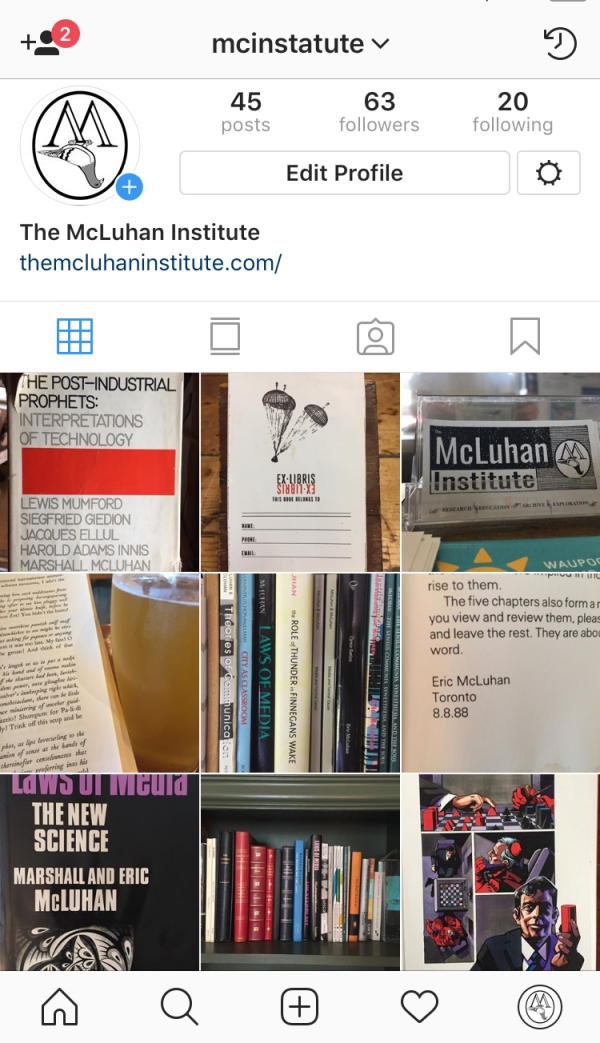
If I’m getting on it it’s likely obsolete, but yeah, I’m on Instagram as @mcinstatute (get it?). There, you get a pictorial representation of this blog. More pictures, fewer words.
Given the situation, it makes more sense for me to share my journey in shorter form, via Instagram, than it does to do it here. I regret that it is so. But it is also fun to experiment with other ways of telling my stories.
And – if you’re interested in the McLuhan Institute, while I am still working on the website (still ‘coming soon’… ugh.) I try to keep people updated via the McLuhan Institute Facebook Page.
As always, thanks for reading.
Andrew.

(an unexpected … twist?)
Return to Howth Castle
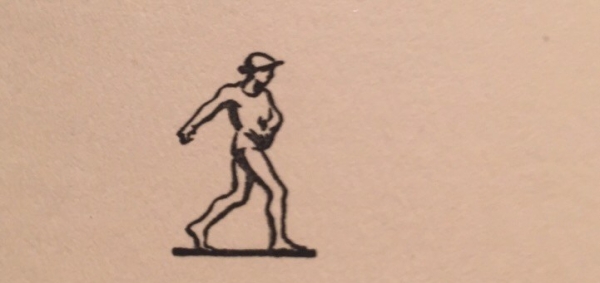
- Colophon of Simon and Schuster.
Dear Reader,
The inventory of the library of Eric McLuhan has begun.
It’s been just two months since he died while we were in Bogotá.
Readers of this blog will know that I began it to document my journey inventorying Marshall McLuhan’s library. Now, as I set to work making an inventory of my father’s library, I will once again try to document some of that journey here.
It will be a bit different this time around. Marshall and Eric’s libraries are related but different. I also don’t have quite the freedom as I did the first time around – I’ll be doing this in what spare evenings I can devote, and I have to move more quickly. I had the luxury of a grant to lean on, now I don’t.
There is also an emotional element which will be tricky to navigate.
Circumstances being what they are, I begin.
[I actually have been spending time out there the last several weeks, organizing, cleaning, and getting ready to start the actual inventory.]
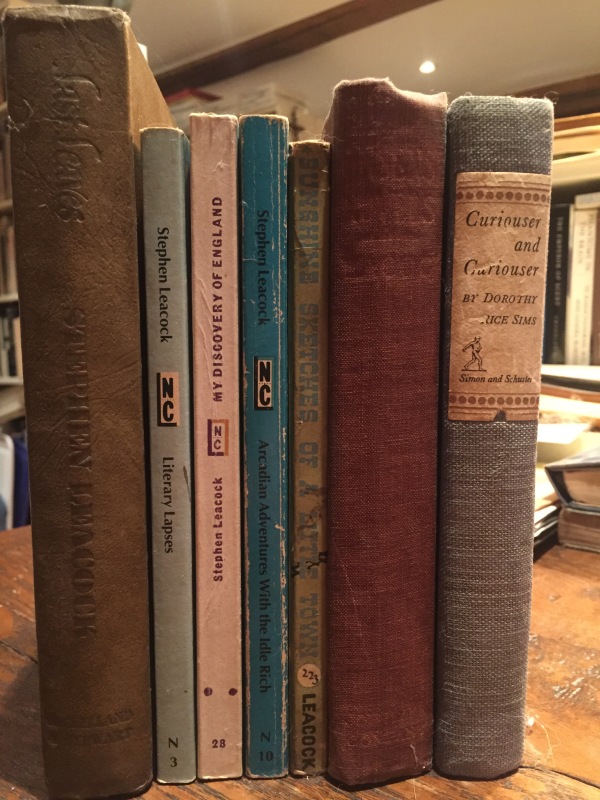 The first handful of books are mostly of Canadian humourist Stephen Leacock. The first book on the first shelf is ‘Last Leaves.’
The first handful of books are mostly of Canadian humourist Stephen Leacock. The first book on the first shelf is ‘Last Leaves.’
‘Last Leaves’ appears to have been bought by my father either just before or just after I was born – I am not positive whether the writing indicated ‘Mar’ or ‘Nov’.
Like his father, Eric passed by his first given name in favour of his second. Marshall’s first name was Herbert, and Eric’s first name was Thomas.
Here is what the inventory looks like:
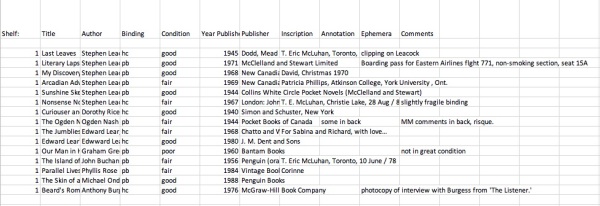
It’s nothing fancy, but it should do the job. This one differs a little from the one I did for Marshall in that I am working off shelves, not from boxes – as the bulk of Marshall’s books were stored in boxes.
I had drawn up a map of the Scriptorium’s shelves years ago, and am using that as my guide. I am starting with the closest shelf to the door, and will work my way through the office, shelf by shelf.
I will also work systematically so that I can keep everything in order and in relation as dad organized it carefully (for the most part). This will also come in handy as the library is not expected to remain in that building – which is why I am beginning my inventory, and why I have time constraints.
Thank you for joining me on this journey. I expect it will be full of interesting tidbits and unexpected turns.
Yours,
Andrew McLuhan,
Picton.
Inscriptorium 2.0 – The Working Library of Eric McLuhan
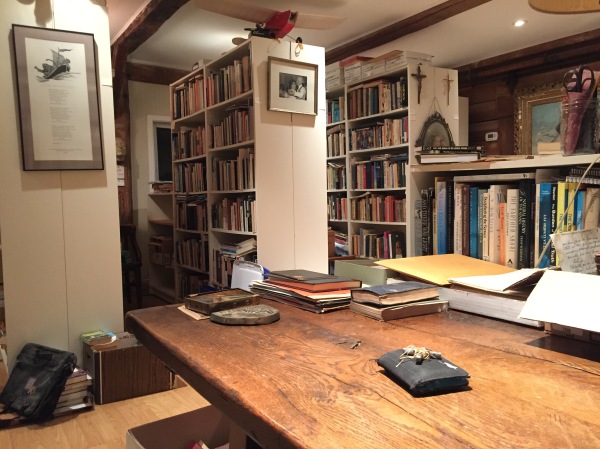
The view from my desk, June 2018
Dear reader,
I am back in the Scriptorium – Eric McLuhan’s library and office in rural Prince Edward County.
Dad died last month, while we were on a trip together in Bogotá, Colombia. On May 17th, he delivered what I think was one of the most important speeches of his career – “Media Ecology in the 21st Century.” [Link to the video coming]
That night, I told him how well he did, how bold he was, how proud I was of him.
He died the following day.
Inscriptorium began as a way for me to document and share some of the remarkable things I came across when I inventoried the library of Marshall McLuhan, prior to its relocation to the Fisher rare book library in Toronto.
I am resuming this blog, because now I will begin to do the same thing for my father Eric’s library. I had considered starting a different blog, but I think it makes sense to pick up this one, as the two libraries have much in common – Eric’s library is an extension of Marshall’s, as Eric’s work followed his fathers though it also explored various side roads.
It will be very interesting, if only to me, to see where this leads. In the time I spent looking at Marshall’s library, I came to know him in an intimate way – he died when I was too young to retain memories. Marshall’s books – with their annotations, notes, whimsical additions, really contained some of his spirit. I suppose they still do.
My desire to be involved with McLuhan work really cemented during the time I spent with Marshall’s books and the ephemera they contained.
I am beginning to catalog and really delve into dad’s library, and all it contains, but I am stating from a more familiar place than I did with Marshall’s. I at least am somewhat familiar with dad’s library, as I have been spending time and poking around in it for many years, whereas with Marshall’s library, I was mostly opening boxes whose contents I had never seen. Even so, I expect surprises, and have already found some.
I will share as much as I can, and look forward to it as I know some of you will also.
I don’t have quite the time to spend on dad’s books as I was able to spend on Marshall’s.
My life has changed a lot in the near-decade since I started on Marshall’s library. I have a wife (Ronika, my love), two young boys (Ezra, 4, and Virgil, 2 – darlings), a modest upholstery business, and the McLuhan Institute [website coming] which I dreamed of, began working on last summer, and am making progress toward. If all goes according to my hopes and plans, the contents of the Scriptorium – Eric McLuhan’s library, papers, archives, and everything all things McLuhan which are not somewhere else – will form the backbone of the McLuhan Institute’s archives and museum. You will be able to come visit, see for yourself.
As with Marshall’s library when I started my inventory of it, where Eric McLuhan’s library will go has not been decided. It is not solely up to me. I have some time to build the Institute, and make my case.
In the meantime, the inventory begins.
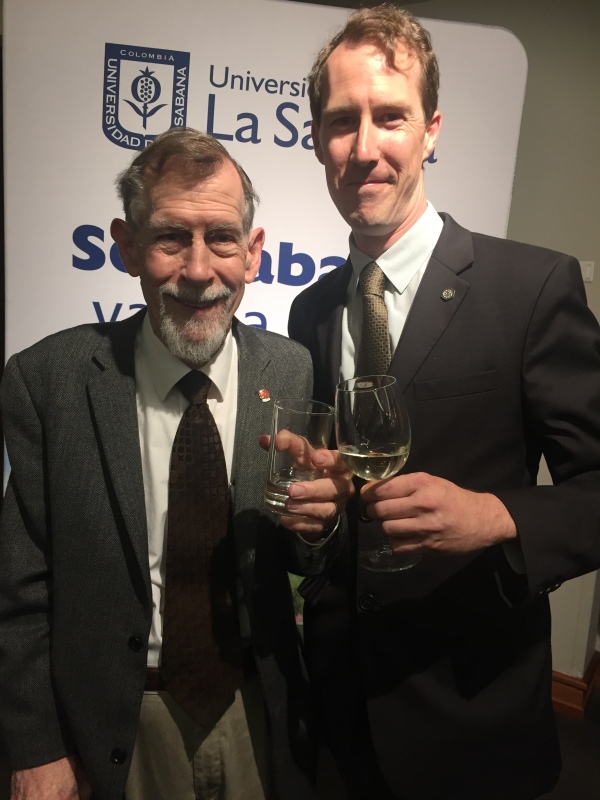
Dad and I at El Nogal, Bogotá, Colombia, following his great speech ‘Media Ecology in the 21st Century.’ 5/17/2018
“Courage!”
-Eric McLuhan, conclusion to ‘Media Ecology in the 21st Century.’
Thank you for being here.
Andrew McLuhan
Picton
6/27/2018
A lone a last a loved a long the
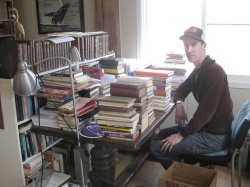
Dear reader;
By way of having something of a tidy end to this collection of discoveries, I present a few thoughts on this blog – how I came to inventory Marshall McLuhan’s personal ‘working’ library – and how I got hooked into my father and grandfather’s work, and some of where it’s taken me since I last posted here….
It seems like a lifetime ago.
December 21st, 2010 – the date of my first blog entry on this website. That’s essentially five years ago. If it’s not a lifetime, it’s an age. It was in December 2010 that I began making an inventory of the personal library of Marshall McLuhan. I’ve since come to refer to it as his ‘working library’, but at the start it was a mass of books, many of them on the shelves of my dad’s library, but largely in boxes in storage in a big red barn. Little more. Incidentally, my dad’s library is in its own little barn in the rural Ontario countryside, and we call it the ‘scriptorium’. That is why I titled this blog ‘inscriptorium’, because it was in that building where, seated on one side of an old English oak refectory table, I began my incredible journey into the intellectual life of my grandfather Marshall McLuhan.
It’s always funny, and/or odd, to look back at the things I have written at a younger age. Even five years is long enough to realize how much I have changed. With that in mind, I may look back at this post after some time and think similar thoughts. How young I was. How little I knew. How much was still to come.
In the winter of 2010 I had only recently become interested in the McLuhan work – I phrase it that way, because I consider much of my father Eric McLuhan’s work to be inextricable from Marshall McLuhan’s work. Eric worked with Marshall for the last fifteen or so years of Marshall’s life, collaborated with him during that time, but also has dedicated much of his life to bringing forward Marshall’s work. I cannot speak objectively of much of this, and won’t try. Eric brought forward many works such as ‘Laws of Media: The New Science’, and ‘Media and Formal Cause’, and has worked tirelessly to champion other of his father’s works such as Marshall’s doctoral thesis, published as ‘The Classic Trivium: The Place of Thomas Nashe in the Learning of his Time’.
My father was very much prepared from an early age to be able to do such things, though I am not sure it was quite along the lines of being groomed for succession. But my father did come to work with his father as much by his own free will as any of us have such a thing. Eric left home to enlist in the United States Air Force (he was born in St. Louis) and earned his Bachelor’s degree while down there. He went on to do further degrees, and has received an honourary one or two.
I was a poor student, uninterested in school after around grade three. My eventual goal was to graduate high school before I turned twenty, and I just managed it. (At this point in my life, I kind of wish I had gotten a Bachelor’s degree along the line, but that wasn’t to be).
I am sure that talking so much about myself is dull (though that’s never stopped me), so suffice to say that my dad and I took very different – if similar at times – paths and so we arrive at very different – if similar at times – places with regard to engagement in the McLuhan work.
My entry into the McLuhan work was as a travel companion and assistant. Eric needed someone to travel with him to Poland for a talk, and I was asked to go with him. Along with a touch of the absent-minded professor, he is a diabetic and sometimes has trouble. He needs someone with him who knows how to help him if he needs help. My mother usually went with him, but she wasn’t particularly interested in Poland (her loss – it’s an amazing place!) so when asked, I said yes. Sounded interesting, and I wasn’t up to much. It was a really great experience for me. I went on a few more trips with him and was pretty much hooked.
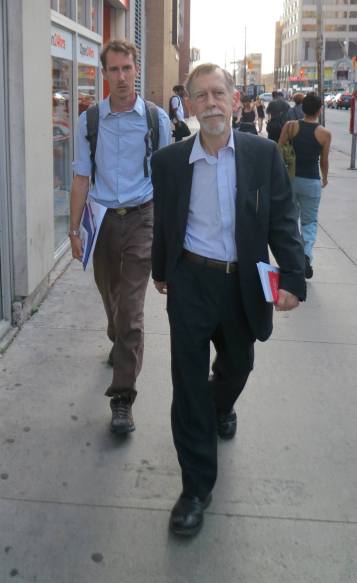
I had tried to dive into the McLuhan world at various points in my life, but it didn’t really stick until I started traveling with my dad. I see myself more as a curator than a collaborator. I don’t know that I’ll have much new to say about these things than my father and grandfather have already discovered, but I am passionate about helping others learn.
Traveling with my father on speaking engagements was the hook, but inventorying Marshall’s library was the point of no return.
I spent about eighteen months working with the library. That may sound like a long time, but it was a real challenge to do it so fast. There may be people who could do the job faster, but not me. I feel as if I could still be at it, five years later.
Interesting things got in the way of speed, as this blog is witness to.
I couldn’t help but pause and explore. The more I saw, the more I wanted to know. I’d call over to dad at his desk and ask what something meant, and I started a list of Marshall’s common abbreviations and their meanings. He would wander over when I brought in a new box from the barn and my desk filled with books which had not seen light of day for years. It was exciting for both of us.
At one point, I thought that some of the annotations would make for fun Twitter posts, so I started up a Twitter account:
http://www.twitter.com/mmreadsbooks
As the posts in this blog demonstrate, many things were discovered and re-discovered, but I only scratched the surface.
There remains so much to be learned from Marshall’s library. Within the pages are all sorts of clues to his life, thought, intellectual development. There’s more than one new angle for a biographer to pursue.
Several of the books are rich with Marshall’s added annotation and material to make for critical editions, or collections of his readings on various subjects.
The possibilities are, if not endless, enormous – but, as I already stated, I do not pretend at objectivity, and so you may not share my wonder and enthusiasm.
Well. All good things, and all that.
In 2011, the centenary of Marshall’s birth in July 1911, Eric was invited to go to Porto Alegre, in Brazil, to speak at PUCRS. I went with him. While we were having dinner, I was speaking to Prof. Eduardo Pellanda about my inventory and he asked if I would present to his students about it. I had my computer with me with my photos (I took a lot, though I wish I had more) and I of course accepted. I have a hard time saying no to things like that. I spent the next day assembling a presentation of images and writing some things to say. I hope what I presented was worthwhile – I enjoyed it.
As times has gone by, and I’ve reflected more on the library and its significance, I’ve been able to speak with more confidence, and with more consideration for the library as an artifact, what it means, and its potential to scholarship – not just as a biographical interest, but as raw material of McLuhan thought which is there dormant, waiting for some light to germinate and flower.
Since my hasty first presentation in Brazil, I have presented at Crossmedia Banff; at the opening of the collection at the Fisher Rare Book Library, its new home (watch here, if you care to. Includes comments by Eric McLuhan); in my new hometown of Picton; and most recently at the University of Manitoba in Winnipeg – Marshall’s alma mater. For the Winnipeg talk, I visited the collection for the first time as a researcher, to get some photos that I didn’t have. I could (and may) write another post on that experience. I hope to be able to have further opportunities to share my love of this collection with more people.
I’ve also started teaching a bit, and have led a workshop on understanding ‘the medium is the message’ (which was a good idea, but too big a topic for one sitting! If I do it again, I’ll do it as at least four separate sessions). And in the last few weeks I have taught my first classes in Toronto to elementary and high school students on some introductory media criticism subjects such as ‘figure/ground’.
The journey continues. Thanks for coming along for part of the ride!
Yours,
Andrew.
LOS – Law of the Sit
Dear reader:
The following is a transcript of writing on a sheet of paper tucked into a schoolbook from Marshall McLuhan’s days at the  University of Manitoba, early 1930’s. The book is A Student’s History of Philosophy, by Arthur Kenyon Rogers (1923, New York: The Macmillan Company). It could be notes for a talk he would have given, in that it is typical of his method of delivering a speech or address: rather than read from a prepared text, Marshall would make notes on a sheet of paper and use those notes as talking points which he would elaborate on in front of an audience.
University of Manitoba, early 1930’s. The book is A Student’s History of Philosophy, by Arthur Kenyon Rogers (1923, New York: The Macmillan Company). It could be notes for a talk he would have given, in that it is typical of his method of delivering a speech or address: rather than read from a prepared text, Marshall would make notes on a sheet of paper and use those notes as talking points which he would elaborate on in front of an audience.
It could also just be a record of some thoughts he had at the time. According to Eric McLuhan, after Marshall’s first stroke in the late 60’s, Marshall had serious memory problems, and began writing more things down as they occurred to him. To me, the following seems more like talking points, or notes for an article, than a statement by the way he writes “explain…” and “mention…”
Personally, I find it a very interesting note. The reader can feel Marshall McLuhan’s frustration: “Mention McLuhan as difficult!”
“Laws of the Sits” is a reference to ‘The Law of the Situation’, attributed to management consultant Mary Parker Follett, although I’ve found none of her works in Marshall’s library The characters in square brackets are my interpretations of Marshall’s short form, question marks where I am unsure. Do feel free to add your suggestions in the comments section below the post.
P[?] Canetti as Crowds via [?] [Elias Canetti, author of “Crowds and Power” -a heavily annotated book in the library]
Forces
Media as forces as new sit[uation]s
Effects 1st [effects precede causes, formal cause]
EOM [extensions of man]
Fission followed by SC [?]
Media as subliminal
eg. inflation
Why the obsess[ion] with transport[ation, Weaver]
theory? all various theories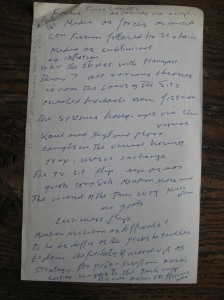
ignore the Laws of the Sit[uation]s
created by each new fission
The systems hang-ups via c/m
visual
Kant and Hegel and Marx
caught in the visual homog[?]
trap: uses vs exchange
The TV sit flip eye as ear
quote Tony Sch.[wartz] Mention Mass and
the reversal of the Am[erican] way Micro[?]
no goals
East-West flip
Mention McLuhan as difficult!
Is he as difficult as the prob[lem]s he tackles
Explain the futility of moral v[iew] p[oin]t as
strategy for prob – rise from [?]
[?] [?] to the tech [?]
[?] – [?]
over
(cont) to Kant and the Rom[antics]
revenge on 18th [century] rationalism
The need to state all hyp[othesis] in [a] way that
they can be disproved
That is my way. Only Krugman
and Lorion have tested any of
my hypoth[esis] in conventional
quant[itative] ways … etc[etera] Nobody ever
atacks my LOS, only me.
I do not use a p[oin]t of v[iew] in seeing
the laws of the sit[uation] … und[erstanding is?] not a p[oin]t of v[iew]
I do not seek agreement but
awareness and knowledge
Explain origin of moral p[oin]t of v[iew]
Kant
I never know what I will find
I don’t claim to be a scientist
ie one who uses quant[itative] methods
in a specialist area of data.
Media as crowds depre[ceates?] private
ident[ity] and increase pub[lic] id[entity] etc[etera]
= LOS
Watergate as revenge for inflation
one behind every Milhouse
Thanks, as ever, for reading.
Andrew.
Update: a few words on a library catalog
Dear reader:
Apologies for not having posted anything yet this new year. Though 2011 is over, some seem to think that Marshall McLuhan’s centenary is also over. It is not! Marshall’s hundred-and-first birthday would have been this coming July 21st. So I will continue, albeit at a slower pace, to post more library finds – in my way, celebrating his life and mind and work.
My posts will be less frequent, mostly because my work cataloging Marshall McLuhan’s working library is pretty much finished – at least, the initial run through. This blog is actually the fruit of my diversion from that task, taking a few moments here and there to exceed my catalog mandate and document a bit further some individual books and their additional contents.
This catalog, with its 5,953 entries, has been an amazing and highly rewarding task. Later on, I might take some time to share with you, dear reader, some of my thoughts on the working library as a whole and its scholarly and biographic implications – which are tremendous.
That said, thanks for reading, and stay tuned for more.
Andrew
Ex Libris Marshall McLuhan
I thought I would share some of Marshall McLuhan’s signatures with you. Marshall signed his name in many of his books. Early on, in his time at the University of Manitoba, and also at Cambridge, he would include more information: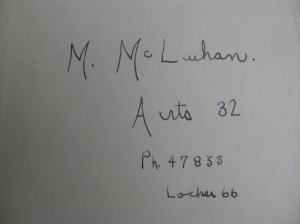
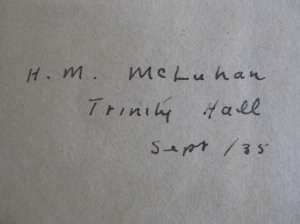 In these photos, you can see several things. Marshall varied his signature from M. McLuhan to H. M. McLuhan, to H M McLuhan, to Marshall McLuhan.
In these photos, you can see several things. Marshall varied his signature from M. McLuhan to H. M. McLuhan, to H M McLuhan, to Marshall McLuhan.
In his university days, he generally included additional information such as school and program, and (more often in England) the place he bought the book. Sometimes a bookseller’s invoice is tucked in between the pages.
I suspect there were several reasons Marshall put his name in the books he purchased. He would lend them out on occasion, so he wanted to make sure people knew whose book it was. I’m sure also some sort of pride of ownership played a role.
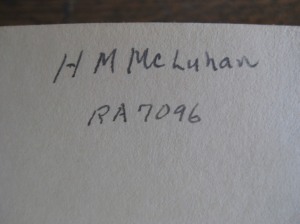

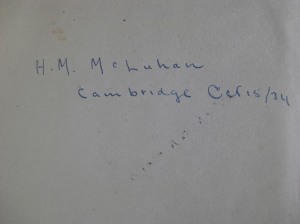
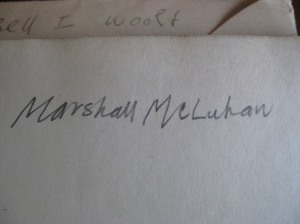
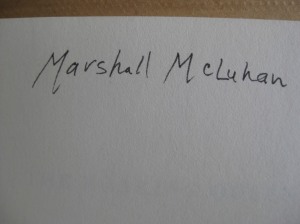
It is very convenient for me, and future researchers, that Marshall McLuhan’s handwriting changed over the years. Because of that, we can ballpark-date much of his annotation/marginalia; because of that we can track his changing interests, his intellectual development.
For example, we can look at a book which he purchased in England in 1935 and made notes in over the years. Marshall’s was a Working Library. He went back to his books, and made new insights each time. So we can see what was notable to him in the 1930’s, 1940’s, 1950’s, etcetera.
Indeed, sometimes he would write a note about this change. In one volume, he wrote in the early 1930’s a few short sentences on morality, and added a postscript a few years later with some embarrassment for his earlier thought.
As I am almost at the end of my initial catalog of the library, and have a fairly good sense of the artifact as a whole, so many implications are becoming clear which I would not have imagined, such as being able to get a sense of intellectual development – and many other things which I hope to post about and share in the future.
Thanks for reading,
andrew
As a post-script, last week I was in Porto Alegro, Brasil, for a conference with Eric McLuhan, and was asked to give a small presentation on the work I’ve been doing with Marshall’s library. Though I had to throw it together last-minute, I spoke for over an hour about the experience and implications for scholarship. It was very satisfying for me personally, and I’d like to thank the amazing people at PUCRS: Eduardo Campos Pellanda, Carlos Gerbase, Magda, Julliana – all the other staff and students who welcomed us and were so accommodating.
I am hoping to make more presentations in the future to share this resource, and to fund further my research. If your institution would be interested in having me present, do get in touch.
Thanks again,
andrew





